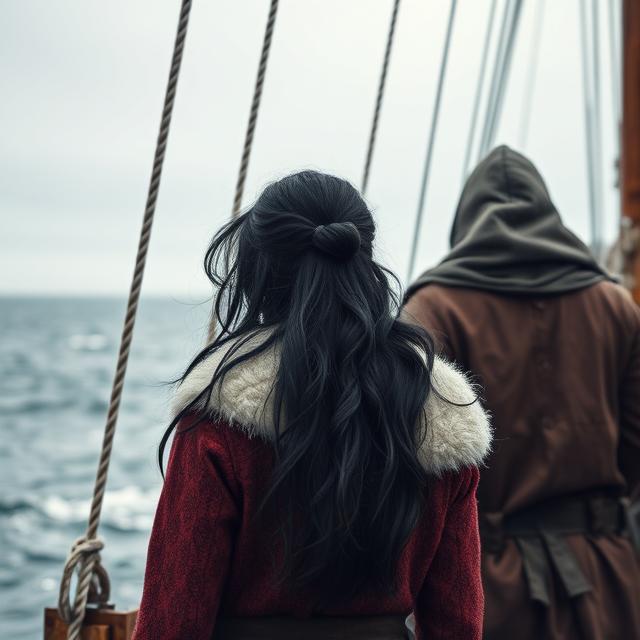You take her hand, feeling the tremor of relief and fear ripple through her fingers. “Then we leave tonight,” you murmur, your voice low, heavy with the finality of choice. Margaret nods, her eyes glistening, and together you slip through the silent streets of Moravice, shadows pooling around your feet like ink. Your guide follows a few paces behind, horse steady and patient, understanding the necessity of discretion.
The city’s gates groan closed behind you as you mount the horses. With each stride, the oppressive weight of your birthright eases, replaced by a thrill that is equal parts terror and exhilaration. The desert behind you becomes a memory; Moravice recedes, its smoke-stained banners fading into the horizon. You ride through the night, guided by the stars and Margaret’s quiet murmurs at your side.
By dawn, you cross into the northern reaches, the air crisp and bracing. Miles of forest and river divide you from Moravice’s reach, and soon the first hints of the Swedish coastline appear: rugged cliffs, windswept meadows, and the distant cry of gulls. Margaret points toward the fortified city of Aldebryn, her relatives’ ancestral seat.


“There,” she whispers. “It is not a kingdom, but it is safe, and here we can be free.”
Aldebryn is a city of timber and stone, perched on a bluff overlooking the sea. The harbor is alive with the clang of iron and the shouts of sailors, while narrow streets twist between spired houses, their roofs tipped with copper that gleams in the sunlight. Margaret’s family receives you with a mixture of curiosity and caution. Her uncle, Duke Jorund, is a man whose stature commands respect; he studies you in silence, weighing the truth of your claim. When Margaret falls to her knees in gratitude, you know the decision was wise.
In Aldebryn, you begin a life that is at once new and intoxicating. You take lodgings within the city’s stone walls, your wealth sufficient to furnish rooms in polished oak and tapestries dyed deep blue and crimson. You and Margaret host gatherings in the great hall, inviting merchants, travelers, and scholars, reveling in music and dance, laughter and wine. Nights stretch into mornings, filled with feasts that seem to erase the ghosts of Moravice and the shadow of your lost house.
Yet despite the splendor, there are moments when your chest tightens with regret. The letter seals, the banners, the whispered names of loyalists now scattered or gone—these haunt your dreams. You sometimes wonder if your flight was cowardice, a betrayal of everything your bloodline represents. But when Margaret’s hand brushes yours across the table, her smile catching candlelight, her warmth anchoring you, the doubts retreat into shadows, leaving only love and resolve.
Months pass, each marked by the quiet growth of your influence in Aldebryn. You invest in trade caravans, in ports and ships, building not only wealth but allies, men and women whose loyalty is forged not from fear but respect. Margaret proves a steadfast partner, her sharp mind a match for any adviser, her diplomacy a bridge to those who might otherwise hesitate to accept a foreign lord among them.
Then, one crisp morning a year after your arrival, news arrives by messenger from Moravice. Your heart hammers as the parchment is unfolded: fragments of intelligence from loyalists who survived the initial coup. The House of Drevanyn is faltering; their grip is tenuous, and subversive pockets—old retainers, merchants, disillusioned soldiers—seek guidance, a figure around which they can rally. Your name still carries weight.
The city of Aldebryn feels heavier now. The walls that once offered safety seem to constrict, the comfortable hearths of your exile suddenly inadequate. Margaret reads the dispatch over your shoulder, her eyes narrowing. “This is an opportunity,” she says. “We can strike now, with momentum. The people still whisper your name—they still believe in you.”
You pace the chamber, the weight of your choices pressing down. One option presents itself clearly: you could send an emissary, a trusted hand skilled in diplomacy, to the subversive factions in Moravice. They could forge alliances, assess loyalty, and lay the groundwork for your return. It is safer than going yourself, reducing the immediate risk of capture or death. Yet it is also slower, leaving the initiative in the hands of others, subject to misjudgment, betrayal, or delay.
The other option is stark and terrifying: to wait, letting the chance slip, and risk that Moravice will consolidate under Drevanyn rule. To do nothing is to let exile solidify into permanence, to let your legacy fade into shadow.
Margaret steps closer, her hand on your arm. “We have built everything here, but Aldebryn is not Moravice. You cannot ignore what you were born to be. We can prepare, and we can strike, but you must act with strategy. The emissary is the first step. Let us not waste lives for rash heroics.”
You look out toward the harbor, the wind tugging at the banners that fly above your home in Aldebryn. Ships wait, merchants prepare, and the sea glimmers like silver in the early light. The thought of sending a trusted agent gives you a sense of agency, a balance between action and caution. You nod slowly, feeling the crow stir once more within your chest—its wings no longer pressing like a warning, but rising, a call to purpose.
“Yes,” you say, voice firm. “We send an emissary. Someone who can navigate the shadows, speak to those who still remember, and gather the allies we need. I will return one day, but first, we ensure the ground is fertile.”
Margaret leans into you, her forehead resting against yours. “Then we move forward together,” she whispers. “Whatever comes, we face it as one.”
Days turn into weeks as you prepare. You select Sir Halvar, a cunning and loyal knight from Moravice who had fled the initial coup, now sworn to your service. He carries letters, seals, and subtle tokens of authority that your loyalists will recognize. Cloaked in plain garb, he sails south, blending among traders, moving unseen through the towns and villages where whispers of the old lord still linger.
Back in Aldebryn, you and Margaret oversee preparations: your wealth is allocated to finance the journey, to support those who dare rise in Moravice, and to secure your own household should you return. Lavish parties continue, both as a means of enjoyment and a way to strengthen alliances in your new city. There are nights when laughter masks anxiety, nights when you curse yourself for leaving behind the banners, the stone, the city that once bore your family’s crest. Yet Margaret’s presence, unwavering and fierce, reminds you that love and life, even in exile, can be victories of their own.
Weeks later, reports begin arriving: Sir Halvar has made contact with subversive pockets, negotiated quietly, and rekindled loyalty in key sectors. Supporters pledge men, funds, and intelligence. The momentum builds, like a tide swelling unseen beneath a calm sea. You read each report with a mixture of elation and apprehension, feeling the weight of Moravice’s future on your shoulders.
You stand once more at the balcony of Aldebryn, wind whipping Margaret’s hair around her face. The city below is alive, a testament to what you have built: wealth, safety, freedom, and love. Yet your eyes drift east, toward the distant lands of your birth. Moravice waits, its streets silent but not empty, its banners not yet torn down. And you, heir, exile, survivor, are ready to rise once more—not alone, but with the woman who dared to stand beside you, her hand clasped tight in yours.
The choice, now, is no longer whether to flee, but when, and with whom. The emissary moves ahead, alliances form in shadows, and the fire within you—the crow, the hunger for justice, for restoration—burns brighter than ever.
You inhale the cold, salty air of Aldebryn, feel Margaret’s warmth by your side, and whisper, “We will return. And when we do, Moravice will remember what it means to bend the knee to a rightful lord.”
And for the first time in a year, exile feels not like punishment, but preparation.
……
You decide to depart at once for Moravice. You prepare your retinue and hire a mercenary company to ensure a safe passage and reach your loyalists.
…..
Yet your love for Margaret makes you hesitate. Why risk everything, and for what—a dream, an illusion? You realize that violence may not be the answer. Instead, you choose to continue supporting the insurrection quietly, initiating a full-scale economic boycott to pressure Lord Ignacjusz to step down of his own accord.

One Comment